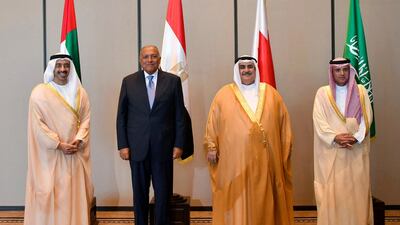Bahrain said it will file an official complaint to the UN Security Council and the International Criminal Court against Qatar, with which ties have been severed over accusations it supports terrorist and extremist groups.
Bahrain’s first deputy speaker Ali Al Aradi said on Tuesday evening that Doha has violated international law and intervened in the internal affairs of Bahrain.
“Qatar has supported terrorism and not only in Bahrain, but also in many other countries,” he said during the Panorama programme on Al Arabiya news channel. “International laws not only classify the act of terrorism as a crime when it is put into action, but also the ideology and planning behind it.
“It is very clear that Qatar violated these laws and agreements in Bahrain by supporting terrorist group.”
Saudi Arabia, the UAE, Bahrain, and Egypt cut all ties with Qatar on June 5 over accusations of support for extremist groups and close ties to arch-foe Iran. Doha denies the allegations.
Mr Al Aradi said that Bahrain’s Council of Representatives has urged the government to form a committee that would monitor and document Doha’s violations against Bahrain to file a complaint to the UN Security Council and the International Criminal Court.
He added: “Qatar has committed [crimes] that fall under what today is called the fourth-generation warfare crimes.”
Fourth-generation warfare is defined as conflicts that can involve the tactics of terrorism and psychological warfare, especially through media manipulation.
“We hope to see the implementation of this suggestion in the next coming days,” Mr Al Aradi said, adding that Qatar has supported “terrorist” groups, including Lebanon’s powerful Shiite Hizbollah group and the Muslim Brotherhood, to destabilise the region.
Read more: Qatar has trampled on bonds of kinship
He said there was evidence that Doha had a “direct” hand in the “unfortunate events” in Bahrain in 2011, when opposition groups protested against the ruling Al Khalifa family.
On August 16, Bahrain's state television aired a report claiming that Doha backed anti-government protests and was complicit in attempts to overthrow the government.
Sheikh Hamad bin Jassem, Qatar’s prime minister at the time, engaged in clandestine telephonic talks with the leader of Bahrain’s largest opposition group and encouraged him to flood the streets with protesters and escalate unrest in the country. Qatar then deployed its broadcasting arm, Al Jazeera, to magnify the protests.
The four boycotting countries are sticking to their 13 demands as well as the six broad principles that they say must provide a framework for any solution. The officials have said that they are open to talks on the implementation of their demands but not their content.
The demands include the closure of Qatar-owned Al Jazeera news channel, which the quartet says provides a platform for extremists and dissidents, and the shutting down of a permanent Turkish military base in the country.

